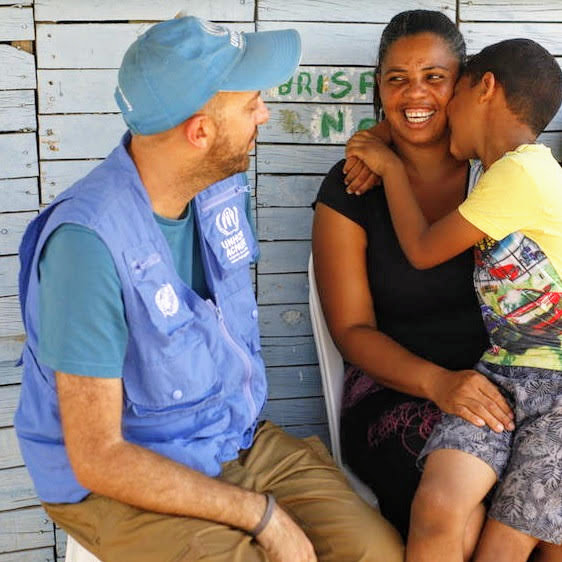Families on the Run - 2020
El Salvador, Guatemala, Honduras, Mexico, 2019 - 2020
Get MicrodataIdentification
UNHCR_RBAC_2020_FOTR_v2-1
Families on the Run - 2020
| Name | Country code |
|---|---|
| El Salvador | SLV |
| Guatemala | GTM |
| Honduras | HND |
| Mexico | MEX |
Multiple causes for displacement, all too often underpinned by violence and persecution, has led to over 800,000 Central Americans fleeing their homes, beginning in 2013. Year after year, there has been an increase in individuals fleeing. This was marked initially by especially large numbers of unaccompanied children, then joined in around 2018 with dramatic increases in families units fleeing Central America. Families are forced to flee together as violent threats and persecution by criminal groups in communities extend beyond individuals to entire family units.
Given these shifting dynamics in human mobility in these countries, UNHCR and UNICEF, through the Interdisciplinary Development Consultants, CID Gallup, decided to undertake this study with the aim of understanding and giving visibility to the forced displacement of families that flee northern Central America. In addition, the study also seeks to shed light on the current trends, protection risks and factors associated to the forced displacement and migration of unaccompanied and separated children.
For this purpose, Gallup conducted 3,104 surveys, complemented by focus group sessions segmented according to the geography of displacement in the region: country of origin, of transit and of asylum. Additionally, interviews were undertaken with families who were part of large mixed movement "caravans" that left Honduras at the beginning of 2020.
Household
Scope
The scope includes:
- Household characteristics
- Income generation
- Education
- Transit
- Departure reasons
- Deportation
- Risks
- Documents detail
| Topic |
|---|
| Health |
| Protection |
| Food security |
| Education |
| Income Generation |
| Basic Needs |
Producers and sponsors
| Name |
|---|
| UNHCR |
| UNICEF |
Sampling
A significant sample was taken of each profile interviewed for a total of 3,104 surveys conducted in Honduras, El Salvador, Guatemala and Mexico. The content of each survey was focused on the following profiles:
Families and children and adolescents at risk of displacement in countries of origin: a total of 789 surveys were carried out with families identified from a non-probabilistic sampling. The surveys were taken in areas with the highest criminality and violence rates in countries of origin (El Salvador, Honduras and Guatemala), which were also areas with a prior history of forced displacement identified through previous studies. The survey questions focused on risks faced by families in their places of origin, including those that would compel them to flee, particularly those related to violence and poverty.
Families and children and adolescents in transit: a total of 836 surveys were carried out with families identified from a non-probabilistic sampling. The surveys were taken at locations where persons in transit were typically found in Guatemala and Mexico, such as Casas de Migrantes. For the quantitative component, data of unaccompanied children and adolescents was gatheredin Casa Nuestras Raices in Guatemala City and Quetzaltenango. This segment of the population was surveyed on the risks they faced during transit as well as the causes of displacement from their countries of origin.
Families and children and adolescents in country of destination: through non-probabilistic sampling methods, 453 people were surveyed, the majority of whom were recognized as refugees or asylum seekers in Mexico. Several interviews were facilitated by the UNHCR Office in Mexico in areas with this population profile: Casa del Migrante Monsenor-Oluta Veracruz, Scalabrinianas Mision con Migrantes y Refugiados, State DIF, Municipal DIF, among others. The survey questions for this population focused on the asylum procedure and their living conditions in the country.
Deported families and children and adolescents: non-probability cluster sampling. Interviews were conducted with 1,026 families that had been detained and deported during the 12 months prior to the survey. Locations included the Guatemalan Air Force base, outside of the Center for the Comprehensive Assistance to Migrants (CAIM for its acronym in Spanish) and outside of the following locations in Honduras: Center for the Assistance of Migrant Children and Families in Belen, and Center for the Assistance to the Returned Migrant (CAMR) and CAMR-OMOA.
Survey instrument
The questionnaire contains the following sections: household characteristics, individual characteristics, details on deportation, risks, transit, settled households.
Data collection
| Start | End |
|---|---|
| 2019-12-01 | 2020-03-30 |
| Name |
|---|
| CID Gallup |
Data Access
UNHCR, UNICEF: El Salvador, Guatemala, Honduras, Mexico - Families on the Run, 2020. UNHCR microdata library, https://microdata.unhcr.org
Contacts
| Name | Affiliation | |
|---|---|---|
| Curation Team | UNHCR | microdata@unhcr.org |
